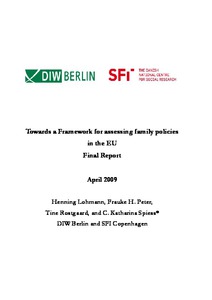Towards a framework for assessing family policies in the EU
"This report presents the results of a first attempt to create a framework for assessing the performance of national family policies. The report is part of a joint EU and OECD project, which aims to help the EU Government Expert Group on Demographic Issues in evaluating national family policies...
| Main Authors: | , , , |
|---|---|
| Institution: | ETUI-European Trade Union Institute |
| Format: | TEXT |
| Language: | English |
| Published: |
Paris
2009
OECD |
| Subjects: | |
| Online Access: | https://www.labourline.org/KENTIKA-19188982124919061649-Towards-a-framework-for-assess.htm |
| Summary: | "This report presents the results of a first attempt to create a framework for assessing the performance of national family policies. The report is part of a joint EU and OECD project, which aims to help the EU Government Expert Group on Demographic Issues in evaluating national family policies. The idea behind the framework is that it allows individual countries to compare their overall performance in the area of family policies with the performance of other countries. The main focus of the report is policies for families with smaller children. The framework provides a set of cross-nationally comparable indicators on contexts, policy measures, and outcomes, organised on a systematic basis. The policy measure indicators presented in the report cover leave schemes, early childhood education and care, family benefits and workplace policies. The indicators build upon, inter alia, previous work by the OECD in various studies on family-friendly policies that were carried out on a cross-national basis using different sets of indicators. Most of these indicators are today available in the OECD Family Database. Wherever the OECD Family Database contains indicators for the majority of EU member states and OECD countries, these data have been used in the present study. Otherwise, data from other cross-national databases have been included. Each indicator in the framework is presented as a single-standing indicator in the general absence of scientific consensus on different aggregation weights. In the report no explicit ranking of countries has been attempted, instead the relative position of countries has been illustrated with the help of standard deviation scores. In the last part of the report the linkages between policy aims and the various context, outcome and policy measures are indicated, which help construct "score cards". This "score card-approach" is illustrated for three countries: Denmark, Germany and the United Kingdom. The report offers tools for assessment that may be developed further, and should offer an approach to using the OECD Family Database, acknowledging this unique data source for cross-country comparisons in the field of family policy." |
|---|---|
| Physical Description: | 94 p. Digital |

